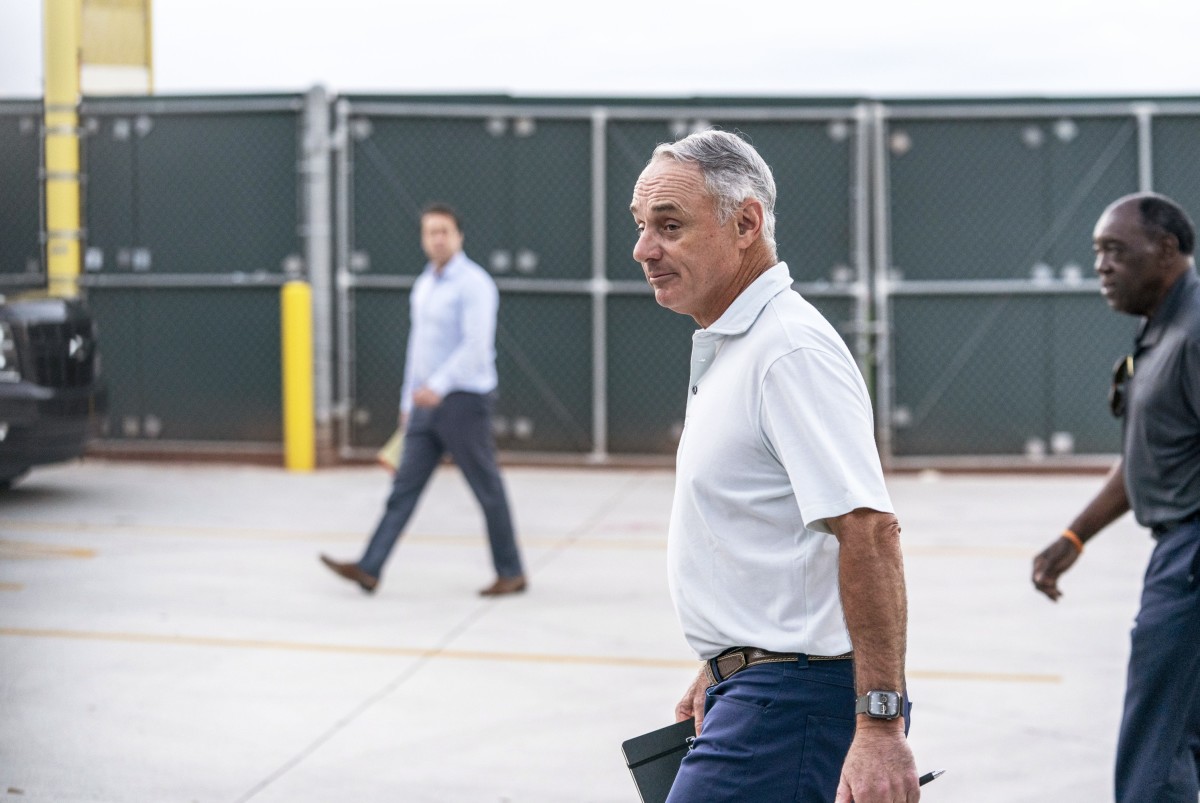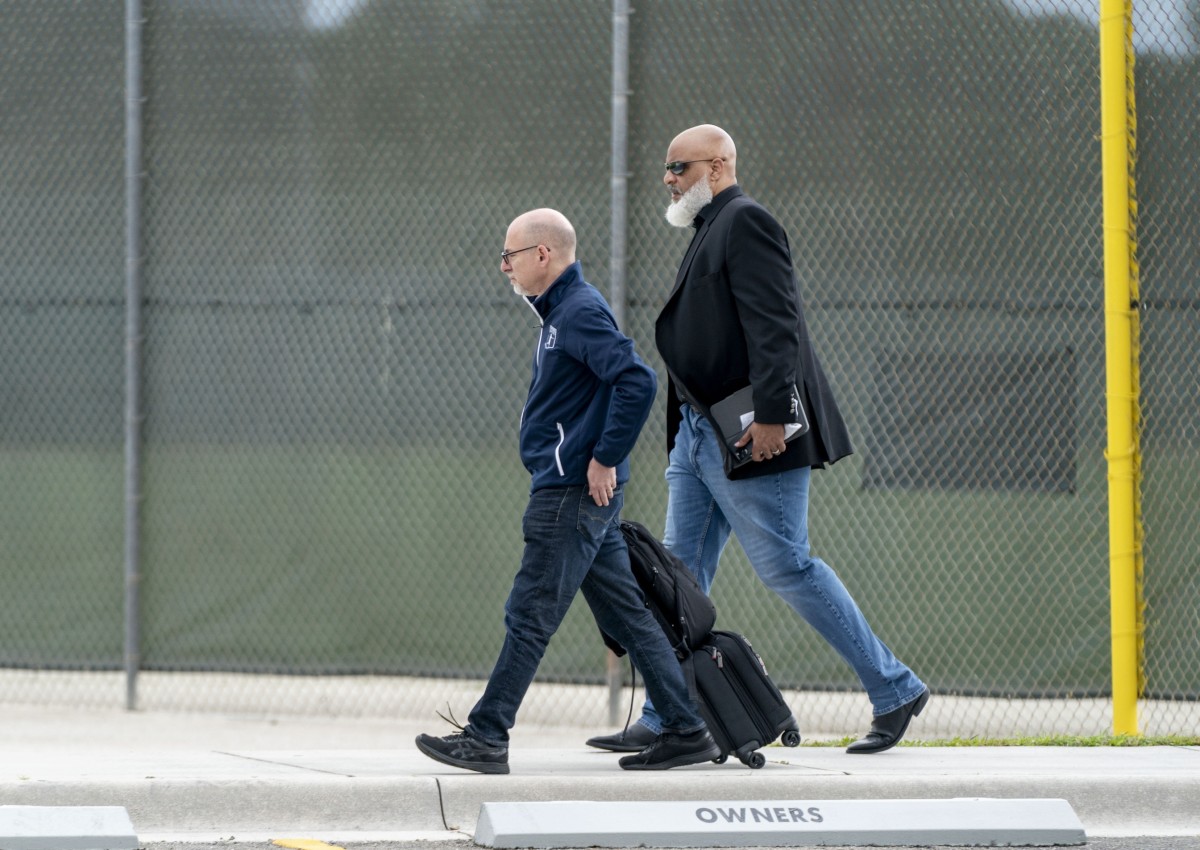Manfred's 'Disastrous' Day Has Come as the State of Baseball Hangs in the Balance
Negotiations were dragging along. Progress toward the return of baseball was nearly impossible to measure. Spring training games were already in peril, though most of the schedule could still be salvaged. Most importantly, so could Opening Day.
When Major League Baseball commissioner Rob Manfred stepped behind the podium at the conclusion of owners meetings in Florida on Feb. 10, the eyes and ears of the baseball world tuned in. Not because fans love to hear what Manfred has to say, but because the owner-imposed lockout—which had already become the second-longest work stoppage in the history of the game—was on the verge of its most critical juncture.
Anything the commissioner said was going to be combed through with intense scrutiny. And the same commissioner that previously called the aptly-named Commissioner's Trophy a "piece of metal" lobbed us a softball quote that everyone in the game could knock out of the park.
"If I hadn't given consideration to what it would mean to miss games, I wouldn't be doing my job," Manfred said. "Obviously, I pay attention to that. I see missing games as a disastrous outcome for this industry, and we're committed to making an agreement in an effort to avoid that."
19 days later, Manfred once again stepped behind a podium in Florida, announcing that disastrous day had come. After nine days of tracking back and forth across a parking lot of Roger Dean Stadium in Jupiter, Fla., MLB and the MLB Players Association failed to reach a new collective bargaining agreement by Tuesday's league-imposed deadline. MLB then followed through on its threat, canceling the first two series of the regular season.
"Today is a sad day," said MLBPA executive director Tony Clark.
A sad day indeed. But not only because games have been canceled due to a work stoppage for the first time since the 1994-95 players' strike. But because the commissioner who oversees America's national pastime is simply out of touch with the game—in a number of ways.
From SI's 'Inside The Mets': MLB Cancels First Two Series Of 2022 Regular Season
First, the optics. When you step up to the podium, at least have the courtesy to appear in a somber mood. After all, games are being taken away from your paying customers. For the second time in three years, the baseball season will be shorter than usual. Instead, just seconds before he announced the cancelation of games, Manfred let out a nervous laugh. A screenshot was grabbed by players, fans and media. Twitter did the rest.
— Jose Trevino (@HipHipJose5) March 1, 2022
Then, Manfred let out another laugh while awkwardly joking with a reporter—in the middle of the press conference. He has to know/understand he's on live television. For the millions of people affected by the loss of games, he can't even act like he's remorseful.
Every agonizing second of Manfred's press conference aired on MLB Network and ESPN. However, the same can't be said for the press conference held by the MLBPA. No, both networks cut away from the union's turn at the podium before its conclusion.
Not a good look.
While Manfred admittedly does not pay attention to Twitter, maybe he should consider it. Throughout the lockout, players have vehemently bashed Manfred and the owners. Meanwhile, anyone with a Twitter account can read unfiltered thoughts from the same players that fans pay their hard-earned dollars to watch at the ballpark.
And now, even the most influential players are speaking out.
"I want to play, I love our game, but I know we need to get the CBA right. Instead of bargaining in good faith - MLB locked us out. Instead of negotiating a fair deal - Rob canceled games. Players stand together. For our game, for our fans, and for every player who comes after us. We owe it to the next generation."
-
Mike Trout
Listen, it's easy to shoot the messenger. But at the end of the day, Rob Manfred is the voice of the owners. What he says at the podium is a direct reflection of where ownership stands. Right now, that means ownership believes the players haven't done enough to move in their direction in order to strike an agreement that would have saved Opening Day.

Before we dissect what lost games could mean for baseball, let's dig a little deeper here. The pain of lost games now puts more pressure on both sides to make a deal so everyone can get back to work and fans can know when baseball will actually return. Naturally, one of the questions Manfred faced was when the two sides will get back to the bargaining table.
"Nothing is scheduled right now," Manfred said. "We made a proposal this afternoon, I believe, without exception. (On) every topic, we have made the last proposal. Every single issue in the basic agreement, we have made the last proposal. You draw your own conclusion as to who ought to go next."
Very blunt. Very clear. The league believes it's the players' turn to call MLB back to the bargaining table. However, the heads of the two parties gave different timelines of when negotiations may continue. Manfred said the union is on its way back to New York, making Thursday the first day they could possibly negotiate. Tony Clark said the union was prepared to stay in Florida and continue negotiations.
But wait, there's more.
On the final day before the lockout, the union made the last proposal to the league. In what ended up being the final meeting before the owners unanimously locked out the players, league officials were prepared to counter, but only if the union took several key asks off the table. The union balked at the request, and the meeting ended after a swift seven minutes.
While it was the league's turn to counter, the first bargaining session on core economic issues did not take place until six weeks after the players were locked out. Even after that, meetings have been sporadic. Urgency didn't pick up until the week before MLB set a deadline to cancel games.
Manfred was asked about delays in bargaining on Feb. 10, and the commissioner's tone and rhetoric was much different than what he displayed Tuesday evening.
“We have consistently tried tactics to move the process,” Manfred said. “In terms of any delay in the process, that's a mutual responsibility of the bargaining process. Phones work two ways.”
Though you may or may not have seen it on MLB Network or ESPN, a rather striking comment from union chief Tony Clark expressed the MLBPA's frustration with these "tactics."
"It is remarkably interesting against the backdrop of the things that needed to be worked through to find ourselves on Feb. 28, over the course of the last week in West Palm Beach, working through the issues that, quite honestly, needed to be, could have been and should have been discussed in more depth much earlier than they were."

During a work stoppage, there will be plenty who picks sides. Ultimately, it doesn't matter if you're pro-owner or pro-player. The responsibility of the lockout falls at the feet of ownership. It's their lockout. As Tony Clark said, "a lockout is the ultimate economic weapon." The owners used that weapon to apply pressure on the union, control the situation and—probably most importantly—prevent the players from their ability to strike. Any repeat of 1994-95 could cripple the game permanently.
The problem now is we've crossed the threshold into lost games. No, it's not as bad at 1994-95 yet. Two series at the beginning of the season doesn't compare to an entirely canceled postseason, including the World Series. Even so, the league is playing with fire.
This isn't the mid-90s. Basketball is far more popular than it was back then. Hockey is trending upward, and is now back on a major national platform. Soccer leagues from all over the world are more accessible than ever, which has brought in more fans. In addition, there are far more entertainment options. Streaming services upon streaming services. There isn't enough time in a day for the average American to watch their shows or dive into new ones.
If baseball fades away, will the casual fan fade away with it? These are issues owners must consider.
In addition, owners risk ruffling the feathers of the die-hard fan base. Jackie Robinson Day on April 15 is preserved for now. But if MLB drags its feet to the bargaining table once again as a "tactic", that day could go by without any player donning the prestigious No. 42 uniform. What's more, this year is the 75th anniversary of when Robinson broke the color barrier. This isn't just some nostalgic day that give baseball fans the warm fuzzies. It's a monumental day in the history of our country.
If baseball were to be shut down on that day? Over a labor dispute? Yikes...
Time has run out for tactics. Now that we've lost games, CBA negotiations will only become more complicated. Players will fight for a full season's pay. The league has said players won't get paid for canceled games. Players have threatened to pull expanded playoffs—something the league desperately wants implemented—from the bargaining table if they aren't paid for 162 games. Throw all of this on top of the significant gaps that still remain across multiple core economic issues.
Tony Clark said the union is "willing to go wherever we need to go to get back in the room and continue the dialogue that has begun, that began a long time ago and had some progress over the course of the last few days against the deadline that (MLB) set." If Manfred and the owners want to reverse the optics, cease any tactics outside the room and force the MLBPA live up to its word.
The future of the game is at risk. Again, this has yet to be as detrimental as 1994-95. But don't let it come anywhere close of getting there. Manfred and the owners—the stewards of the game—have a moral obligation to America's national pastime to get the game back on the field. And if they really want the optics to change, lift the lockout. If the players go on strike, then it falls on them. Just as writers like myself who have consistently reminded fans this is an owner-imposed lockout, I'm under the same obligation to put a strike at the players' feet.
If more games fall off the schedule, more damage will be done to the game. And if this already "disastrous outcome" flirts with the same kind of irreparable damage baseball suffered in the mid-90s, there won't be a steroid-fueled home run chase on the other side to save it.
More From SI's InsideTheRangers.com:
- First Two Series of MLB Season Canceled; League, Union Fail to Reach New Agreement
- Mailbag: What Will The Rangers Do After This 'Stupid & Pointless' Lockout?
- 'We're In Good Shape': Rangers Prepared For Chaotic Post-Lockout Activity
Make sure to like 'Inside The Rangers' on Facebook
